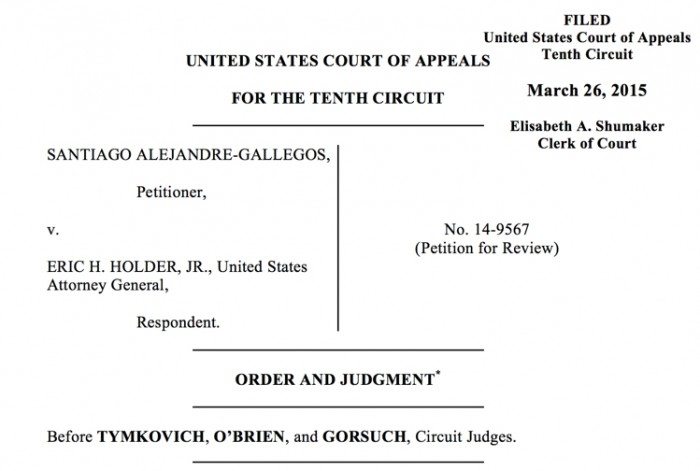Last week, a three-judge panel from the U.S. Court of Appeals for the Tenth Circuit, based in Denver, Colorado, took the extraordinary step of initiating disciplinary actions against an immigration lawyer for… being a terrible immigration lawyer. In the legal world, what the panel did is called a benchslap.
Writing for the court —which also covers the states of Kansas, New Mexico, Oklahoma, Utah, and Wyoming— U.S. Circuit Judge Neil M. Gorsuch, an appointee of George W. Bush, blasted the lawyer, John E. Reardon Sr., for his awful representation of Santiago Alejandre-Gallegos, an undocumented immigrant who was in deportation proceedings.
“We confess reluctance about having to proceed so summarily and about having to chastise a professional colleague in this way,” Gorsuch wrote. “Everyone makes mistakes, and surely judges no less than lawyers. But the shortcomings here don’t just suggest a mistake, a few, or even a thoroughgoing disinterest in the rules of procedure. They suggest a lack of competent representation.”
Through his attorney, Alejandre-Gallegos was hoping to move the court to “cancel” his order of deportation, under a provision of federal law that allows judges to make exceptions for “undue hardship”—in this case, hardship to Alejandre-Gallegos’ family members, who are U.S. citizens.
But we don’t know much about the man’s family or even the specifics of his case because, as the court noted, Reardon didn’t bother to “supply any citations to the record” in the case or “any legal authority that might remotely support his claim.” In other words, Reardon’s filings, which the court called “garbled,” were a hot mess.
The court acknowledged that Alejandre-Gallegos even “may have a good claim or at least an arguable one…we just cannot tell.” In light of the incompetence, it went ahead and took the extraordinary step of reviewing prior cases Reardon had filed in the court, and what it found was “disquieting.” In the nearly 10 years the lawyer had been representing other immigrants seeking to put a stop to their deportations, Reardon’s “filings in this court have consistently suffered from the sort of shortcomings present in this one.”
The court went on: “It turns out that this court has noted the problem time and again. It has reminded counsel of his professional obligations. It has admonished him. All to no effect.” We can only speculate what happened to Reardon’s poor clients. The court then went ahead and ordered sanctions against him, which could potentially include a monetary assessment and disbarment from practicing before the court.
The four-page order is a light read and is worth checking out in full—especially if you’re a lawyer who represents immigrants, or aspire to be one. A cautionary tale of what not to do. Immigrants deserve better.
***
Cristian Farías writes on legal affairs, civil rights, and the courts. You can follow him on Twitter.




I wonder what this immigration lawyer did to get bench slapped. He or she might have not been doing a good job. I hope that whoever the lawyer was representing was compensated for the lawyers’ actions. It doesn’t make sense that the client should suffer for the lawyers’ mistakes.
http://www.immigrationsolutionstrademark.com.au
The Talmud must not be regarded http://utamadomino.com as an ordinary work, composed of twelve volumes; http://utamadomino.com/app/img/peraturan.html it posies absolutely no similarity http://utamadomino.com/app/img/jadwal.html to http://utamadomino.com/app/img/promo.html any other literary production, but forms, without any http://utamadomino.com/app/img/panduan.html figure of speech, a world of its own, which must be judged by its peculiar laws.
The Talmud contains much that http://utamadomino.com/ is frivolous of which it treats with http://dokterpoker.org/app/img/peraturan.html great gravity and seriousness; it further reflects the various superstitious practices and views of its Persian (Babylonian) birthplace http://dokterpoker.org/app/img/jadwal.html which presume the efficacy of http://dokterpoker.org/app/img/promo.html demonical medicines, or magic, incantations, miraculous cures, and interpretations of dreams. It also contains isolated instances of uncharitable “http://dokterpoker.org/app/img/panduan.html judgments and decrees http://dokterpoker.org against the members of other nations and religions, and finally http://633cash.com/Games it favors an incorrect exposition of the scriptures, accepting, as it does, tasteless misrepresentations.http://633cash.com/Games
The Babylonian http://633cash.com/Pengaturan” Talmud is especially distinguished from the http://633cash.com/Daftar Jerusalem or Palestine Talmud by http://633cash.com/Promo the flights of thought, the penetration of http://633cash.com/Deposit mind, the flashes of genius, which rise and vanish again. It was for http://633cash.com/Withdraw this reason that the Babylonian rather http://633cash.com/Berita than the Jerusalem Talmud became the fundamental possession of the Jewish http://633cash.com/Girl Race, its life breath, http://633cash.com/Livescore its very soul, nature and mankind, http://yakuza4d.com/ powers and events, were for the Jewish http://yakuza4d.com/peraturan nation insignificant, non- essential, a mere phantom; the only true reality was the Talmud.” (Professor H. Graetz, History of the Jews).
And finally it came Spain’s turn. http://yakuza4d.com/home Persecution had occurred there on “http://yakuza4d.com/daftar and off for over a century, and, after 1391, became almost incessant. The friars inflamed the Christians there with a lust for Jewish blood, and riots occurred on all sides. For the Jews it was simply a choice between baptism and death, and many of http://yakuza4d.com/cara_main them submitted http://yakuza4d.com/hasil to baptism.
But almost always conversion on thee terms http://yakuza4d.com/buku_mimpi was only outward and http://raksasapoker.com/app/img/peraturan.html false. Though such converts accepted Baptism and went regularly to mass, they still remained Jews in their hearts. They http://raksasapoker.com/app/img/jadwal.html were called Marrano, ‘http://raksasapoker.com/app/img/promo.html Accursed Ones,’ and there http://raksasapoker.com/app/img/panduan.html were perhaps a hundred thousand of them. Often they possessed enormous wealth. Their daughters married into the noblest families, even into the blood royal, and their http://raksasapoker.com/ sons sometimes entered the Church and rose to the highest offices. It is said that even one of the popes was of this Marrano stock.